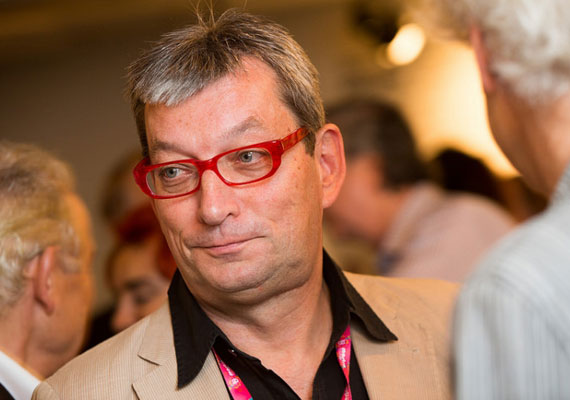Meinolf Zurhorst • Jefe del departamento cinematográfico ARTE de ZDF
"La televisión es más profunda de lo que aparenta"
- Cineuropa ha entrevistado a Meinolf Zurhorst durante el taller CineLink Drama para charlar sobre las actuales tendencias en televisión y el futuro de los cineastas en el mercado de la pequeña pantalla

Este artículo está disponible en inglés.
Meinolf Zurhorst is one of the most experienced professionals in the world of European television. A well-known producer and film critic in the 1980s, in 1992 he started out as commissioning editor and director in the cinema department of ARTE in Strasbourg. Since 2000, he has been head of the ARTE film department of ZDF – one of ARTE’s shareholders – which is responsible for film acquisitions and co-production. He is involved in the Sarajevo Film Festival’s newly founded CineLink Drama initiative as a lecturer and mentor for upcoming TV series from the region. Cineuropa sat down with him during the CineLink Drama workshop to talk about current TV trends and the future of filmmakers in the small-screen market.
Cineuropa: Do you think it is necessary for film festivals to also focus on the TV market, in particular by organising workshops?
Meinolf Zurhorst: I believe it is important to expand more into TV series, especially during this transitional period for the marketing and distribution of feature films, where the audience has other platforms besides the cinema to watch content. We should also allow young professionals to understand what kinds of high-end series are in demand by the networks and the audience. The workshops play a major role, as it is completely different examining popular series like Breaking Bad, for example, compared to actually learning how to build a series that can last. TV is more profound than it seems.
Is it easy for filmmakers to adapt to this different way of storytelling that is endemic to a series?
Yes, we have some concepts that have a limited number of episodes, even if it is theoretically a long-lasting series, because their narrative is horizontal, while others can run for years, as they use a vertical, episode-to-episode way of storytelling. The horizontal storytelling is interesting to classic filmmakers, as this is an epic form of storytelling, basically. So you can go in-depth by giving lots of details, analysing your characters psychologically, and having more subplots that make sense because you can finish them. It’s like a saga, and it’s something you can’t do in a movie, where time is fairly limited.
Do you believe that the TV market is currently more accessible than the film market?
At the moment, yes. Currently, it is easier for filmmakers to gain access to the TV market, initially because of the narrative, and it is easier to get financed for future TV projects from different services like VoD or even classic broadcasters. In this sense, it is important to have workshops like CineLink Drama in order to inform the participants what the situation is internationally and what still needs to be done. What is it practically that makes a particular series stronger than others?
We have seen that trends such as “Nordic Noir” are now coming to an end. How feasible is it to predict and adapt to future TV trends?
It is not that easy, as we only know the ratings from classic broadcasters. We don’t have any input from streaming services. The content stays there forever, available for many years. So the only way you can know if something works or not is if it is continued. Even though every genre should be tested in a different way, from science fiction to zombies to Scandinavian crime dramas, everything should have a certain “twistiness”, otherwise it doesn’t hold any interest. So you can’t always adapt; you must find something new to invent. And this is not easy, of course.
How about Balkan TV trends? What would you suggest is a “regional” genre?
I think that there is no need for more historical series at the moment. I would prefer to see a contemporary political drama series. There are so many conflicts, financial problems and corruption issues, plus the ethnic and religious diversity of the Balkans, which could produce something completely different. Not something exactly like House of Cards, of course, but still content with local issues for a European audience, at least. Going glocal is a good strategy. That is why the Nordics were so successful with their crime series – they used contemporary stories rooted in their societies. Maybe now that has been overdone, but still, they used local elements for an international audience.
We don’t see any German TV series making a mark on the international level. Do you think that you have a completely different market?
It’s not completely different, but we don’t produce this kind of high-end series. We have more long-lasting ones, with vertical storytelling. But now we are all on tenterhooks for Babylon Berlin by Tom Tykwer, which is based on Volker Kutscher’s novel of the same name and is set in Berlin in the late 1920s and early 1930s, just before the Nazis came to power. It is probably the first time that this horizontal storytelling has been presented at this level on German TV. Also, we rarely see anything that takes place before World War II, an era that was so rich, culturally. Berlin Alexanderplatz by Rainer Werner Fassbinder could be thought of as a role model for this series, but it was broadcast 40 years ago, and it’s almost been forgotten. I feel that Babylon Berlin might re-establish the 1930s in a new way and might inspire more stories about that period.
¿Te ha gustado este artículo? Suscríbete a nuestra newsletter y recibe más artículos como este directamente en tu email.















